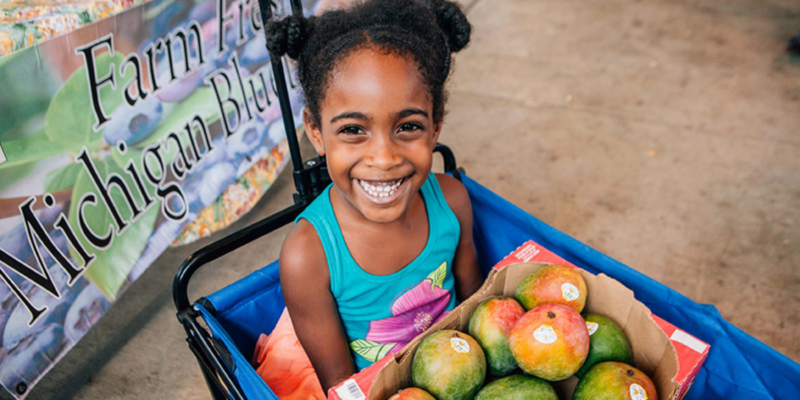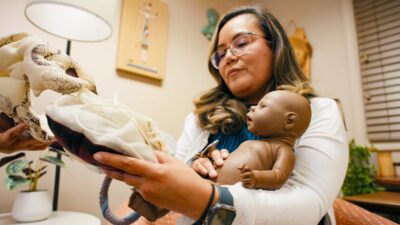Farm to early care and education is a foundational program that connects young children with local food production by bringing farm-fresh food into early care and education settings and offering experiential learning with edible gardens, cooking and tasting fresh fruits and vegetables. Early care and education providers purchase food for meals and snacks from local farmers and producers, increasing healthy food access for young children and expanding market access for small and midsize farmers.
Farm to early care and education initiatives work across systems, linking education, health and agriculture to support children’s cognitive, physical and social-emotional development; improve community nutrition; and build sustainable local food systems.
The COVID-19 pandemic laid bare the inequities and vulnerabilities in our educational and food systems, and underscored the urgent need for federal and state action to invest in communities and programs that support our youngest learners.
Farm to early care and education is a systemic approach to quality early learning, nutrition support and sustainable food systems.
“Farm to early care and education is connecting kids to food production and natural spaces – and rebuilding those very human connections to a sense of place and the confidence to grow and select their own food.”
Hawthorn McCracken, Rooted
Farm to early care and education reaches children where they already are.
In the United States, nearly 13 million children under the age of 6 spend an average of 30 hours each week in non-parental care settings.2 Farm to early care and education enables providers to offer critical nutrition support, by serving healthy meals to children and sharing resources for healthy food preparation with parents and caregivers. One in three families with children are struggling with food security,3 and the meals their children get in early care and education settings can be a major source of their daily nutrition. Many early care and education sites also operate year round, ensuring that the children who need it most have access to healthy food all year.
Farm to early care and education addresses a critical upstream determinant of health for children.
Farm to early care and education is an integral part of high-quality early learning.
Farm to early care and education provides creative and exciting ways to meet a variety of early learning standards for cognitive, social and emotional development. Tending to an outdoor garden, measuring ingredients and cooking together are experiential opportunities for children to work in community and develop new skills. The 2018 Farm to Early Care and Education survey noted providers’ motivations for participation comes from improving health and education outcomes for young learners, including teaching children where food comes from and how it is grown (96%); improving children’s health (95%); and integrating opportunities for experiential learning (95%).
Farm to early care and education creates new market opportunities for small to midsize farmers.
An equitable and sustainable food system means supporting farmers and workers across the supply chain with a living income. It also ensures that sustainable and healthy food is available in early care and education, school, retail and community settings. Because early care and education providers purchase seasonal fruits and vegetables year-round, they become an important source of income for small to midsize farms and local food hubs, especially those owned and operated by farmers of color and women. Early care and education providers can also serve as a hub for the pickup of local products – helping expand farmers’ customer base.
State policymakers have a unique role to play in expanding farm to early care and education.
Our children cannot wait.
“We’re as successful as we are in Georgia making system-wide change because we have the Departments of Early Care and Learning, Education, Public Health and Agriculture, who are all stakeholders in this work … and we’ve had private foundations who see the value in this network and nonprofit leadership really pushing for innovation and being nimble enough to bring everyone together.”
Kimberly Della Donna, Georgia Organics
View and download this policy brief
Discover more policy briefs about Farm to Early Care and Education
Farm to Early Care and Education Means a Community Working Together
Opportunities to Improve Farm to Early Care and Education Procurement
Resources to Grow the Farm to Early Care and Education Movement
Investing in Farm to Early Care and Education
This guide is for funders and all who seek to support farm to early care and education programs that nourish children, families and communities.
The W.K. Kellogg Foundation works to strengthen opportunities for the health and well-being of children, families and communities through investments in equitable food and learning systems. Over the last five years, the foundation has invested $18 million to support National Farm to School Network, Policy Equity Group and state partners in building a vibrant network of farm to early care and education programs and sharing best practices and tools for expanding the model across the country.








Comments